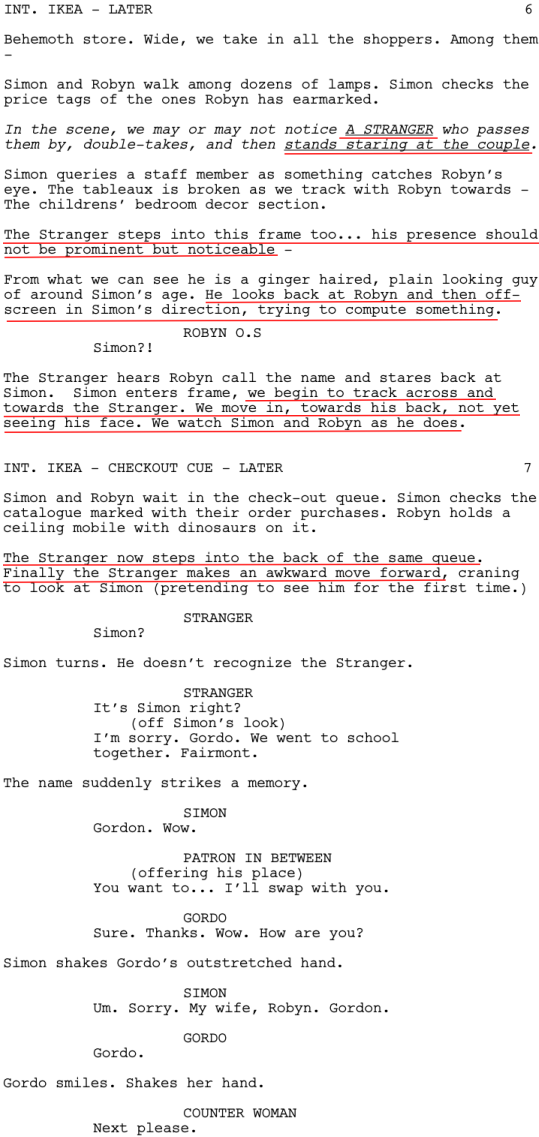“Hitchcockian,” “thematically rich,” “they don’t just make films like this anymore” – The Gift (2015), written and directed by Joel Edgerton, received very positive reviews. And justly, for it is a great thriller. To me, it is much better than Gone Girl, where, I think, the element of psychological deviation has excessive importance, making the theme less relevant.
[partial spoiler follows]
Robyn and Simon, a young, affluent couple, move from Chicago to L.A. He is a successful manager. She is a designer, a beautiful, sensible person who recently suffered an emotional breakdown (the reason for their move to a new city). Everything is perfect as they start their new life (the two are freshly married): the house in the hills is splendid, they are in love, trying to have a baby. The problems begin when, by chance, Robyn and Simon meet Gordon, Simon’s old high school classmate, who happens to live nearby. Despite his being slightly socially awkward, Gordon’s kindness in welcoming his friend to the neighborhood (reflected in the gifts he makes to the couple) seems genuine. At least to Robyn. But Simon finds it inappropriate to encourage Gordon’s presence in their life, so he tells him they aren’t going to see him anymore.
Some mysterious accidents will follow. A traumatic past between Simon and his classmate will slowly come to light…
The screenplay is remarkable in many aspects:
- Mastery in handling information, especially the many surprises: the dramatic episode in the past; the precautions we didn’t know Simon took regarding Gordon after meeting him in L.A.; learning of Simon’s mean behavior in his workplace; discovering Gordon’s hostile maneuvers…
- The sense of menace created without recourse to violence. The script mostly capitalizes on Gordon’s presence somewhere outside the couple’s house (actually, the character is absent from the scene for most of the movie: it is the psychological reactions he triggers in the couple, and especially in Robyn, that generates tension) and on his ambiguity (Gordon will act as if he wants to make peace with Simon, punishing Simon being only a secondary option).
- The way subtext is controlled and played down in the first part of the story, when Simon and Gordon are aware of something (what happened between them decades earlier), that Robyn and the audience ignore.
- An interesting moral theme: the importance of respecting other people and of being truthful, even if society favors competition and rewards unethical behavior. The theme is totally organic to the development of the plot: we will discover that it directly inspires the plan of the antagonist.
- The undermining of viewers’ expectations, breaking the rules of the genre: for example, at a certain point, we are convinced that the kidnapped dog of the couple will be cruelly killed, when instead…
I will conclude this list by highlighting the way a particularly interesting scene was written. It occurs at the beginning, when, newly-arrived in L.A., Simon and Robyn meet Gordon in a shop.
The situation depicted in the scene is quite ordinary. Nothing particularly bad happens. Yet, the writer manages to establish a subtle sense of incipient menace. Let’s have a look at how this tension is created on the page (in the movie, the scene is a little shorter).
I have copied below the first part of the scene. You will appreciate how Edgerton accomplished his task through three moves:
- The entire situation is immediately framed (the capital letters, the underlining) as an uncomfortable one for the couple: a stranger is spying them.
- The scene is consequently written with a stress on our point of view as witnesses of an unexpected event developing before us: Gordon, recognizing the old classmate, learning that he is married and has moved to town.
- We initially see the back of the stranger; the possibility of seeing his face is delayed. Who is this mysterious guy?
- The script smartly suggests the way to shoot the scene, without interrupting the flow of the action or being intrusively technical. The moves of the camera should make our point of view overlap the one of the stranger, while he is studying Simon and Robyn (which stresses their vulnerability). Then, once the expectations of the audience are set up, our point of view widens again, letting us see from a privileged position the moment the “victims” are approached.
Here is the scene (emphases mine; note that Gordon is referred to as “Gordo,” since this was his nickname at school):



Be First to Comment